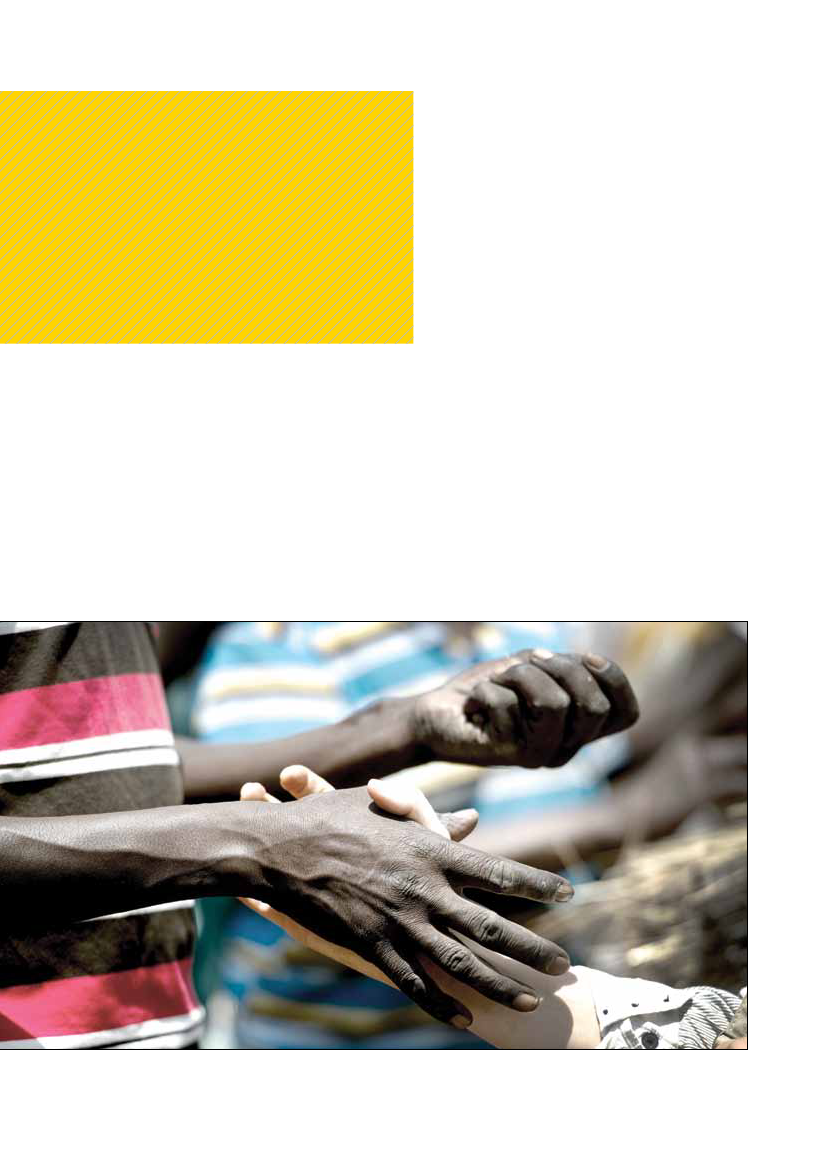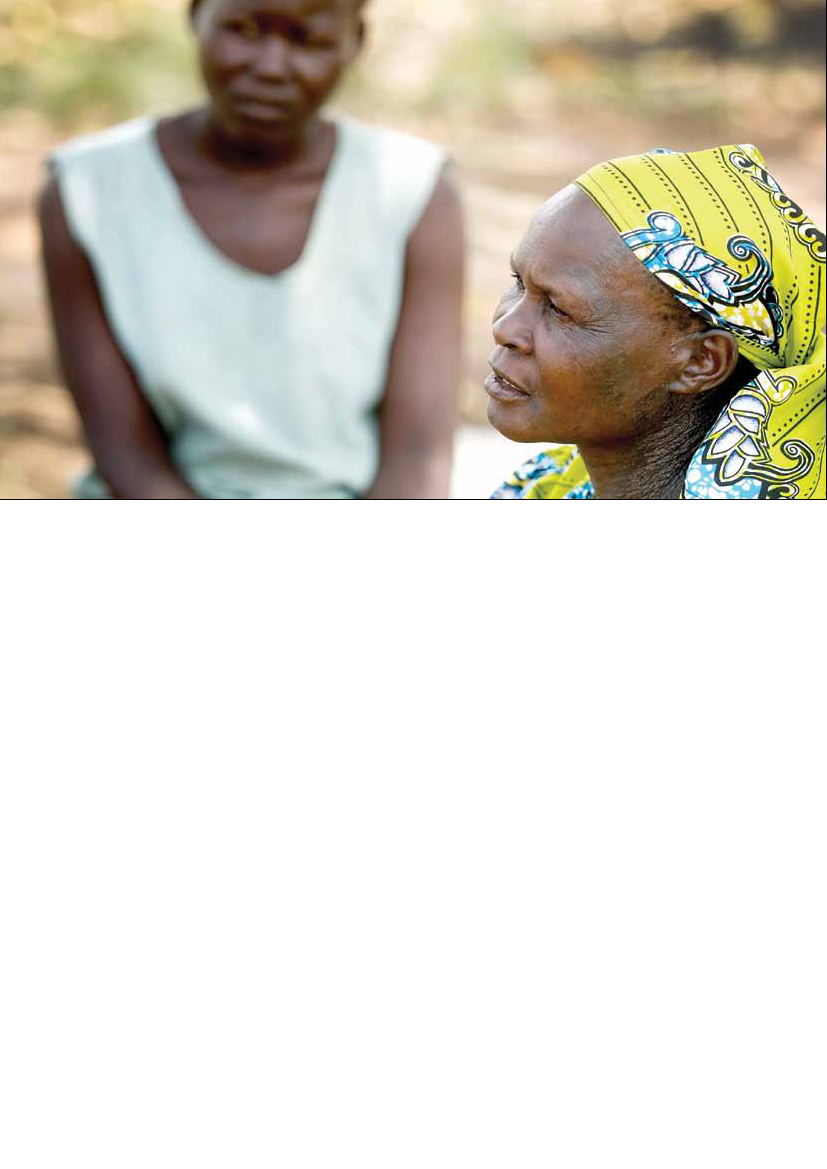Udenrigsudvalget 2012-13
URU Alm.del Bilag 193
Offentligt
RepoRt June 2013
countrycSoroadmapS
How EU delegations can strengthenengagement with civil society
country cso roadmaps
1
design: Anne mousten
ACKnoWLeDGeMentSThe report on country CSO roadmaps is a continuation of Concord Denmark’s work planfor the Danish EU Presidency in 2012, which included a high-level EU Presidency confer-ence ‘Engaging Civil Society and Local Authorities: Civil Society Organizations, HumanRights and Development’, several lobby meetings in Denmark and Brussels around theCouncil conclusions of the Foreign Affairs Council in May 2012 and strong coordinationwith the Cypress EU Presidency on the Council conclusions of the Foreign Affairs Councilin October 2012. I am grateful for this opportunity to take part in the follow-up.Also thank you to partners and stakeholders in Ghana and Uganda for contributing withtheir valuable insights and analysis. About 20 interviews with representatives from civilsociety, donors, think tanks and private consultants, was conducted in Kampala and Ac-cra during February and March 2013. The lack of up-to-date and comprehensive analysisof civil society in Ghana and Uganda has been a major challenge and the report could nothave been made without their input.Early conclusions of the report were summarized in a policy note on ‘EU Cooperation inthe Evaluation of Danish Civil Society Strategy’ (January 2013) and at a seminar on ‘EUDevelopment Cooperation after the Lisbon Treaty’ at the Danish Institute for Interna-tional Studies (DIIS) and a workshop on “How civil society can strengthen its engagementwith the EU Delegations” organized by Concord Denmark (April 2013).A special thank you to Mads Hove, Laust Leth Gregersen and Christian Juulsgaard Olsenfrom Concord Denmark for their valuable support and comments to drafts versions.AccrA, June 2013
Morten Emil HansenAUTHOR OF REPORT
2
contEntS
rEcommEndatIonSdEFInItIonSLISt oF acronymSForEWord1. IntroductIoncivil society in a new eracSo funding trendsaid Effectiveness
34568889
2. BacKGroundEu’s legal commitmentsnew institutions and new challengesLack of strategic civil society involvementthe complexity of Eu funding
1010111112
3. a nEW Eu paradIGmagenda for changeEu’s engagement with civil society in external relations
131313
4. cSo roadmapSa joint Eu approach to civil society
1415
5. Eu dELEGatIonS6. Eu and cIVIL SocIEty In GHanaa weak and uncoordinated civil societyEu delegationsmulti-donor financingconclusion and recommendations
161717171818
7.
Eu and cIVIL SocIEty In uGandacivil society under pressurerigid and inflexible civil society fundingopposing views on civil society dialogueconclusion and recommendations
1919191920
8. cIVIL SocIEty anaLySIS and dIaLoGuE9. concLuSSIonrEFErEncES
212223
rEcommEndatIonS
European development actors; the European Commission (EC), EU Delegations, national Member Statesand civil society organizations all have important roles to play in promoting a more strategic and systematiccollaboration at all levels between EU and civil society. Everyone must recognize that the EU’s new CSOcommunication is a paradigm shift in EU development cooperation. The collaboration must take a humanrights based approach that ensures non-discrimination, participation and inclusion, transparency and ac-countability for all actors at all levels.
european Commission (eC)Musturgently clarify the role of civil societyin theprocess of developing country CSO roadmaps. Thelack of clarity risks undermining the CSO ownershipand thereby also the quality and impact of the coun-try CSO roadmaps.Must increase the financial and human resources atthe EU Delegations and ensure capacity building andtraining of EU Delegation staff. Regular evaluationsof civil society involvement in specific policy process-es must be undertaken in order tofacilitate a cultureof learning, which continuously improves the toolsand mechanisms for civil society dialogue.Mustpromote multi-stakeholder dialogue ap-proaches,which create a space for dialogue andinteraction between EU Delegations and MemberStates, civil society and government. This approachmust be used in all areas of government policies andmust also include broader EU policies on e.g. trade,migration and human rights..
eu Delegations Mustdevelopclear and predictable schedules andguidelines for consultations,which ensure thatcivil society gets the necessary documentation, suf-ficient time for preparations and proper feedback andfollow-up. The institutional mechanisms for dialoguemust be described in the country CSO roadmaps. Mustshare guidelines and toolboxes for country CSOroadmaps in order tobuild confidence, trust andownershipamong local and national civil society ac-tors. Ideally, EU Delegations should initiate civil soci-ety-led assessments of the CSO context. Mustinclude Policy coherence for development(Pcd) and human rights obli�gations in its civilsociety dialogueand ensure that civil society viewsare included in annual delegation reports, evidence-based PCD reports and national human rights reports.
Civil society organizationsMustdemonstrate a strong commitment to thecountry cso roadmapsand engage in a constructivedialogue with the EU Delegations, where CSOs them-selves promote broad participation from local CSOsand community-based organizations by providingtechnical expertise and capacity building.Mustcontribute to the analysis of an enabling envi-ronment for civil societyby monitoring key elementssuch as fundamental human rights e.g. freedom ofopinion and expression, right to information andfreedom of peaceful assembly and association.Mustmonitor and evaluate national processes ofdeveloping country cso roadmapsin order to holdEU Delegations accountable to its obligations, andfacilitate regional learning among CSOs as well as theEU and Member States.
european Member StatesMusttake active part in the development of countrycso roadmaps from the early stagesand support theEU Delegations with analysis, contacts and simplybring credibility to the process.Must build partnerships with civil society organiza-tions andensure an enabling funding environment,which is long-term, predictable and supporting in-stitutional capacity building.Must be more vocal about human rights violationsand the shrinking policy space andbe supportive ofcivil society views in the political dialogue with gov-ernments.
4
country cso roadmaps
dEFInItIonS
country cso roAdmAPsare the basis for a new and more structured dialogue and strate-gic cooperation between EU Delegations and civil society. Country CSO roadmaps must pro-vide a sound understanding of a diverse local civil society, including their roles, capacities andconstraints, legitimacy, interests and dynamics. Country CSO roadmaps are in principle ‘EUCountry CSO strategies’ shared by the EU and its Member States and will be updated annu-ally. It is the ambition to finalize country CSO roadmaps at all EU Delegations by the 1st ofJanuary 2014 (EC 2012b).Policy diAlogueis an ‘open and inclusive dialogue on development policies’ (Accra Agendafor Action 2008). But a genuine policy dialogue needs to be structured, institutionalized andtake place at all levels of government. Holding governments accountable is vital in order totranslate the principle of “democratic ownership” into practice.civil society orgAnizAtions(CSOs) include a wide range of formal and informal organiza-tions created voluntarily by citizens, which can vary in structure, governance and scope. Theiraim is to promote an issue or an interest, either general or specific. In a broad sense, CSOs in-clude all non-market and non-state organizations and structures in which people organize themto pursue shared objectives and ideals (EC 2012b).PArticiPAtory develoPmentrecognizes civil society organizations as legitimate actors inthe development process. They should be enabled to express voice, participate in political, socialand economic dialogue processes, demand accountability and be involved in monitoring publicaction (EC 2011).enAbling environmentis a functioning democratic legal and judicial system that ensures- in law and in practice - the freedom of opinion and expression, freedom of peaceful assemblyand association, and the possibility to secure funding and to participate in public affairs withthe aim of effectively and freely contributing to the public sphere (EC 2012).
country cso roadmaps
5
LISt oF acronymS
AAAAcPconcordcsPcsocsrdAcdevcoececAecdPmedFeeAseitieueudgbsingosldcsmFFngosnsAodAPcdPrsPsPsPsWAP
Accra Agenda for ActionAfrican, Caribbean and Pacific Group of CountriesEuropean NGO Confederation for Relief and DevelopmentCountry Strategy PaperCivil Society OrganisationCooperate Social ResponsibilityDevelopment Assistance CommitteeDirectorate General for Development and Co-operation EuropeAidEuropean CommissionEuropean Court of AuditorsEuropean Centre for Development Policy ManagementEuropean Development FundEuropean External Action ServiceExtractive Industries Transparency InitiativeEuropean UnionEuropean Union DelegationGeneral Budget SupportInternational Non Governmental OrganizationsLeast Developed CountriesMultiannual Financial FrameworkNon-governmental organizationsNon-state actorsOfficial Development AssistancePolicy Coherence for DevelopmentPoverty Reduction Strategy PaperSector Policy Support ProgrammesSector Wide Approaches
6
country cso roadmaps
ForEWord
In October 2012 the EU Council adopted “The roots ofdemocracy and sustainable development: Europe’s en-gagement with Civil Society in external relations”, alsoknown as the CSO communication. It was the culmina-tion of a long dialogue and consultation process, called‘Structured Dialogue’, organized by the EU Commission,which involved more than 700 stakeholders and repre-sentatives from civil society, partner countries, MemberStates, the European Parliament and the European Ex-ternal Action Service (EEAS), including EU Delegations.The CSO communication has been positively welcomedand acknowledged by European civil society organiza-tions. CONCORD Europe called it ‘the most constructiveofficial EU document on CSOs in many years’ (CONCORDEurope 2012). The ambitious goals and objectives areshared and European civil society recognizes the signifi-cant improvement in dialogue at Brussels level. But inpartner countries the implementation of the CSO com-munication has not yet begun. Most southern civil so-ciety organizations are not even aware of EU’s renewedcommitment and EU Delegations are still waiting for in-structions and guidelines.This report analyses the EU decision to promote a moreenhanced and strategic engagement with civil society or-ganizations at EU Delegation level. It includes illustrativecase studies from Ghana and Uganda in order to identifythe challenges and opportunities arising from the EU de-cision. While Ghana is relatively democratic, but has weakand uncoordinated civil society structures, Ugandan civilsociety is experiencing a narrowing of the political space,but the CSOs are comparably better organized. Still, theexperiences with EU policy dialogue are comparable andcall for an urgent rethinking of current practices and in-stitutional setups at EU Delegations.
It is the objective of this report to establish a solid foun-dation for Concord Denmark’s member organizations andEuropean partners to support their southern partners inthe dialogue with EU Delegations on country CSO road-maps. In addition, the report should build a solid andevidence based contribution to a strong civil society per-spective in Denmark’s future strategy on EU’s Develop-ment Policy and incorporation of the EU dimension inDenmark’s forthcoming policy on civil society in develop-ment cooperation.DG DEVCO is responsible for the implementation of theCSO communication and has generally been open to dis-cuss and meet with Concord representatives. But disap-pointingly, this has not been the case in this study. Re-quests for interviews and background information oncountry CSO roadmaps have continuously been submit-ted over a period of four months, but DG DEVCO has notshared any materials. The lack of transparency seems tobe one of EU’s biggest challenges in order to enhance itscooperation with civil society. A recent study from OECDstrongly recommends that donors promote a transpar-ent and inclusive process on CSO strategies in order tocreate trust and ownership among CSO stakeholders(OECD 2011b).Civil society organizations must naturally acknowledgethat it takes time to translate new policies into practice.But the role of civil society in EU development coopera-tion and the principle of participatory development hasbeen a formal mandate of EU Delegations since 2000.There are consequently no good excuses for lack of per-formance in the past – nor for delays in implementing agenuine participatory process in the future. It is time foraction.
country cso roadmaps
7
1
IntroductIon
Civil society in a new eraOver just a few decades, civil society organizations (CSOs)have grown massively in size and numbers and are play-ing an increasingly prominent role in international devel-opment assistance due to their ability to serve the needsof the poorest and most marginalized communitiesthrough grassroots and participatory approaches. Civilsociety organizations, movements, alliances and net-works have also risen to become a global political power.The global financial crisis and the spontaneous uprisingsand transformations during the Arab Spring have funda-mentally changed the public perception of governmentsand institutions, which needs to be more transparent,accountable and inclusive.A strong and vibrant civil society is generally regarded asimportant in its own right and even a public good, whichpromotes better democratic practices and policy out-comes. Civil society organizations have therefore gainedofficial recognition as stakeholders, which need to beconsulted and involved at national, regional and interna-tional levels. The aid-effectiveness agenda in the OECDand the post-2015 process in the UN reaffirm the con-sensus among governments and international agencies.But at the same time the political space for civil societyis shrinking, in particular in Africa. Two-thirds of Africangovernments have introduced legislation that reducesthe space for civil society organizations, especially affect-ing civil society organizations that are politically activeor receive international support. National civil society isincreasingly facing difficulties in accessing funding frominternational donors, being legally registered as nationalorganizations or engaging in rights-based activities (CI-VICUS 2013).
CSo funding trendsGlobal funding for civil society has increased substan-tially in the last decade and reached 16.2 percent of totalOfficial Development Assistance (ODA) in 2010. Accord-ing to OECD, the total CSO funding for all DAC donorsincreased by 25 percent between 2007 and 2009 (OECD2011b). The increase has mainly been composed of aidchanneled through CSOs, while the volume of core aidhas remained relatively stable (Keijzer 2011). In manycountries the distribution of government funding forCSOs has been ‘historically grown’. Bilateral donors havesupported CSOs that had long standing relationships andbased on a ‘privileged’ position with more or less auto-matic or guaranteed funding (Keijzer 2011).Still, many donors do not see civil society actors as stra-tegic intermediaries in reaching their own developmentobjectives (INTRAC 2010), and CSO funding thereforetend to follow changing donor policy preferences andother opportunities (Keijzer 2011). Donors still prefer tosupport the urban-based CSOs and networks, which canmeet the financial requirements. It also seems that thereis a growing tendency to favor big projects and fundingconsortiums of CSOs at the expense of small-scale ac-tions at grassroots level (Keijzer 2011). In the case of EU,the calls for proposals clearly tend to favor the best-re-sourced, mainly urban-based, organizations over under-resourced and mainly rural-based organizations (ECA2009).The decentralization of donor funds has created a pushfor stronger accountability and representation from thenational CSOs towards local partners and constituencies.INGOs must prove their added value and comparativeadvantage and many donors, especially the Nordic-plus
8
country cso roadmaps
group, are engaged in southern based funding mecha-nisms, which enable southern CSOs to access funds di-rectly. But the southern-based funding mechanisms arecriticized for favoring the fewer, larger and urban-basedCSOs and thus undermining the donors’ own objectivesof supporting a sector-wide and diverse civil society. Theemerging consensus to support southern civil societydirectly from local embassies and delegations could po-tentially lead to more isolated and stand-alone activitiessince ‘embassy funds’ are often small scale and targetedat a wide range of local and often very small CSOs (IN-TRAC 2010).
But aid effectiveness initiatives have largely been donor-driven, state-centric and technocratic, most notably inthe case of general budget support. EU cooperation onbudget support often fails to include CSO consultationand the EU communication on budget support describesa limited role for civil society in monitoring and holdinggovernments accountable (CONCORD Europe 2012). Theaid effectiveness agenda may potentially lead to aid con-centration as donors align priorities, which is a threat toa diverse and vibrant civil society in the south (INTRAC2011 and EC 2011).Donors move toward joint funding to align with the ParisAgenda principles of harmonization and alignment butalso due to cost-saving measures and reduced transac-tion and administration costs. As a result, the burdenof coordination is pushed onto civil society, as CSOs areexpected to work in consortia with a lead agency tak-ing the contractual responsibility (Keijzer 2011). Donorsacknowledge that the use of southern based fundingmechanisms and different types of intermediaries im-pact negatively on the strength and diversity of southerncivil society and agree that the southern based fund-ing mechanisms need to be better understood (INTRAC2010). But a recent evaluation shows that the EC gener-ally has a limited reflection on the impact of the new aidarchitecture on civil society (EC 2011).
Aid effectivenessThe Aid Effectiveness Agenda has led to a renewed em-phasis on ‘ownership’ and state-led development strate-gies. This marks a radical shift from traditional projectapproaches to sector approaches, implemented throughnew aid modalities such as General Budget Support(GBS), Sector Wide Approaches (SWAPs) or Sector PolicySupport Programmes (SPSPs).The Aid Effectiveness Agenda recognizes the importanceof broad ownership of national development policies,transparency and accountability to citizens. Article 20 ofthe Accra Agenda for Action (AAA) and article 22 of theBusan Declaration explicitly refer to civil society organi-zations (CSOs) as independent development actors intheir own right (OECD 2008 and OECD 2011).PhotoJonAs leegAArd Andersen
country cso roadmaps
9
2
BacKGroundeu’s legal commitmentsThecotonou Agreementsigned in 2000, was the firstmajor EU policy document which legally committed theEC to civil society participation as a fundamental prin-ciple of development cooperation. This changed civilsociety from mere beneficiaries of EC funding to actorsin development processes and was seen as a major stepforward in EC approaches towards civil society (Keijzer2011, EC 2008).The EC communication on theParticipation of non-state Actors in ec development cooperationfrom2002, covered all actors other than government, i.e. in-cluding local government, private sector, trade unionsand economic partners (both profit or non-profit). Thiscommunication was an attempt to clarify the principle ofparticipatory development agreed in the Cotonou Agree-ment. The communication reaffirms that working withnon-state actors (NSAs) is a legal obligation for both EUand its developing partners (Keijzer 2011).non-discriminatory access to basic services, participationin democratic political processes, transparency and ac-countability, justice and the rule of law, and with a focuson poor and vulnerable groups. And it acknowledges thatan empowered civil society is a crucial component of anydemocratic system and is an asset itself (EC 2012d).Theeu strategic Framework on human rights and de-mocracy,adopted in 2012, sets out principles, objectivesand priorities for Europe’s shared human rights workand includes a strong commitment to develop a genuinepartnership with civil society. In order to respond to theparticular needs of individual countries, EU-delegationswill develop national human rights strategies for almost160 countries worldwide. National human rights strate-gies will establish country-specific priorities and objec-tives in order to achieve stronger impacts on the ground(EC 2012a).the ec’s communication ‘the roots of democracyand sustainable development: europe’s engagementwith civil society in external relations’,adopted bythe Council on 15 October 2012, is EU’s new CSO strat-egy which promotes a more strategic and systematic ap-proach to EU’s engagement with civil society. It coversEU’s engagement with local CSOs in developing, neigh-borhood and enlargement countries (EC 2012b).
‘ … NSAs ought to be permanently and systematically in-volved across the definition of country strategies and theprogramming process’(EC 2002).Theeuropean consensus on developmentwas agreedon in 2005 by the EU Heads of States, the European Par-liament and the EC and recognizes the vital role of civilsociety in particular as promoters of democracy, socialjustice and human rights. It also commits the EU to en-hance its support for building capacity of non-state ac-tors in order to strengthen their voice in the developmentprocess and to advance political, social and economic dia-logue (EC 2005a).Thelisbon treatywas signed by the Heads of States andGovernments and entered into force on 1st of December2009. The Lisbon Treaty reinforces EU’s long-term objec-tive to eradicate poverty and actively promote an open,transparent and regular dialogue with civil society. It re-quests the EC to undertake broad consultations with rel-evant stakeholders in order to ensure that EU actions arecoherent and transparent (EC 2009).TheAgenda for changewas adopted during the Dan-ish EU Presidency in 2012, and calls for a human rights-based approach, promoting the right to universal and
‘THE rooTs ofdEmocracy and sUsTainablEdEvElopmEnT’:‘The roadmaps should identify long term objectivesof EU cooperation with CSOs and encompass dia-logue as well as operational support, identifying ap-propriate working modalities. This exercise should belinked to the programming of EU external assistance,namely bilateral, regional and thematic cooperation.The human rights country strategies currently beingdeveloped by the EU will be an important reference.The roadmaps should be developed taking into ac-count the views of civil society, be regularly updatedand where appropriate, made publicly available andshared with national authorities’ (EC 2012b).
10
country cso roadmaps
new institutions and new challengesThe Lisbon Treaty has fundamentally changed the or-ganization of Europe’s foreign policy, which has con-sequences for EU’s development assistance and themandates and responsibilities of the European Exter-nal Action Service, DG DEVCO, EU Delegations and EUMember States.The creation of the European External Action Service(EEAS) was one of the most significant changes of theLisbon Treaty aimed at having a more unified and coher-ent position on international affairs. EEAS is responsiblefor the programming, planning, and implementation ofdevelopment assistance and is functionally autonomousfrom other EU bodies - but has a legal responsibility toensure consistency with other EU policies (ECDPM 2012b).The first evaluation on the functioning of the EEAS bythe High Representative in December 2011 had a narrowfocus on the immediate ‘Lisbon tasks’ and therefore nomentioning of civil society (EEAS 2011).DG DEVCO was created in 2011 (a merger between DGDEV and DG EuropeAid) and is responsible for the man-agement and implementation of EU development as-sistance. DG DEVCO is likely to experience staff reduc-tions and budget cuts, as a consequence of the newMulti-annual Financial Framework 2014-2020 (ECDPM2011, APRODEV 2013). DG DEVCO and EEAS are supposedto collaborate and develop joint programming, but EUMember States have already raised concern about thelack of clarity of roles and responsibilities between DGDEVCO and EEAS. DG DEVCO is currently present in ap-proximately 150 worldwide EU Delegations.The Lisbon Treaty has strengthened the role of EU Del-egations, which represent EU in third countries on e.g.diplomatic issues, political relations, security, and tradeand development assistance. EU Delegations consist ofstaff from EEAS, DEVCO, Trade and other directorates,and while EEAS has the overall responsibility for the del-egations, including programming, DEVCO has the admin-istrative responsibility, including the implementation ofdevelopment assistance. But EU Delegations are oftenunderstaffed to fulfill the role expected of them underthe Lisbon Treaty (ECDPM 2011).
cussions, both at country level and globally. Most bilat-eral and multilateral donors recognize that consultationswith civil society bring added value to their policy makingand they generally believe that their dialogue with civilsociety is satisfactory (OECD 2011).But findings from the OECD peer reviews show that thedonor satisfaction is often not shared by civil society or-ganizations (OECD 2012a). The inclusion of civil society‘voice’ is mostly ad-hoc or tokenistic (INTRAC 2010), andit appears as civil society consultations are tick-the-boxexercises which undermines the donor credibility (OECD2011a).In 2009 the European Court of Auditors found that theEU Delegations did not systematically involve Non StakeActors (NSAs). Instead the EU Delegations typically in-vited for one-shot consultations on their overall strategydevelopment, whereas CSO involvement in implementa-tion, monitoring and evaluation was non-existing. TheEuropean Court of Auditors therefore concluded that theEC involvement of NSAs falls short of the sustained andstructured dialogue envisaged by the EU legislation andthe EC’s own guidelines (ECA 2009).An EC evaluation from 2008 also found major gaps be-tween the EC commitments towards civil society andthe actual implementation. The evaluation concludedthat there was limited strategic reflection and dialoguewith the various stakeholders on how best to use theCSO channel in a specific country or sector context (EC2008).The official assessment of lack of performance of theEC is generally shared by civil society. CONCORD Europerecently described the EC staff in HQs and EU Delega-tions as having an ‘instrumental or limited vision of civilsociety that is not conducive to building confidence andstructured relationships’ (CONCORD Europe 2012).CONCORD Europe also analyzed the on-going consulta-tion on the next Multi-annual Indicative Programme(2014-2020) and concluded that exercises involved lit�tlemore than presentations from the delegations to civil so-ciety of their plans and left civil society participants witha feeling that they were part of a tick-the-box proc�ess(CONCORD Europe 2013). The lack of performance is gen-erally explained by an absence of clear mechanisms formanaging consultations, late invitations, delays in dis-tributing documents, consultations at a late stage in theprogramming process, limited NSA participation, and in-sufficient feedback to NSAs on the results of the consul-tations (ECA 2009).
Lack of strategiccivil society involvementGovernment and donor interest in civil society dialogueand political advocacy has been growing substantially inthe last decade, and most donors have increased theirsupport for civil society to engage actively in policy dis-
country cso roadmaps
11
KEy rEcommEndaTions fromEca (2009) and Ec (2008):Ensure political and managerial leadership (particu-larly in ‘difficult partnerships’).Adopt a country specific overall strategic approach toworking with NSAs.Improve consultation mechanisms.Mainstream participation across sectors and areas.Invest in knowledge on civil society processes; andidentify more suitable procedures to engage strategi-cally with NSAs.
to engage in domestic political processes. Donors gen-erally allocate earmarked funding rather than core sup-port (OECD 2012). But the strengthening of civil societyin democratic gov�ernance and the defense of humanrights re�quires a flexible set of funding modalities,including small-scale grants and dedicated human re-sources at the headquarters and delegation levels india�logue with their partners in civil society (CONCORDEurope 2013).EU requirements are exceptionally cumbersome. In2008, only 404 applications under the thematic budgetline covering non-state actors were selected out of 5339concept notes received, which is a success rate of only7 percent (OECD 2012). The EU funding procedures andadministrative rules have evolved into an accountantand administration based logic, to the detriment of anapproach oriented towards results. This leads CSOs todedicate a lot of time and resources to the managementof EU funding and to present projects without innovativeelements (CONCORD Europe 2012).DG DEVCO is acknowledging the need for more flexibilityand one of the outcomes of the Structured Dialogue was12 technical fiches on funding modalities, but it is doubt-ful if the EC can become less control-orientated and rigidin order to accommodate the needs from a fluid and con-stantly evolving civil society (EC 2008).PhotoyilmAz PolAt
the complexity of eu fundingThe OECD Peer Review of the EC (2012) found that thecomplexity of EU funding procedures is a serious obsta-cle, which must be addressed if EU wants to fulfill itsgoal of a stronger civil society (OECD 2012). In particularthe ‘Calls for Proposals’ regime is an inherent contradic-tion as it supports and favor large international CSOswith the ‘right’ set-up and institutional capacity ratherthan small CSOs and NSAs, which are often times mostin need (ECA 2009).But even worse, EU funding is viewed as a serious hin-drance due to its lack of core funding, which is key foradvocacy CSOs who need legitimacy and independence
12
country cso roadmaps
a nEW Eu paradIGmA number of new EU policies and strategies have createda new paradigm in Europe in terms of EU’s commitmentto promote and engage strategically with civil society.proach to development and recognizes civil society as anasset for any democratic system and its role in buildingjust, equitable and inclusive societies. EU encouragesand supports partner countries in promoting a meaning-ful and structured participation of CSOs, in the contextof their domestic policies’ dialogue as well as budget pro-cesses (EC 2012d).According to the CSO communication, local civil societyis at the heart of EUs future development assistanceand EU will promote civil society participation in do-mestic policies, although many governments in partnercountries is not necessarily sharing EU’s commitment to‘transparent and accountable governance’.
3
An Agenda for ChangeThe EC communication on Agenda for Change (2011) hasa rather limited and instrumental understanding of civilsociety mainly as ‘watchdogs’, when governments fail onhuman rights and democracy. But the civil society per-spective was even worse in the EC Green Paper on EUdevelopment policy (2010) and it was mainly due to theinstrumental role of civil society during the Arab Springthat the EC communication evolved from a narrow strat-egy on economic growth to a broad development strat-egy which included a focus on civil society (EC 2011).During the Danish EU Presidency in the first half of 2012,the role of civil society was strengthened remarkably inthe negotiations on EU Council conclusions on Agendafor Change (May 2012), which calls for a human rights-based approach, promoting the right to universal andnon-discriminatory access to basic services, participationin democratic political processes, transparency and ac-countability, justice and the rule of law, and with a fo-cus on poor and vulnerable groups. And it acknowledgesthat an empowered civil society is a crucial componentof any democratic system and is an asset itself. EU andthe Member States will also support and promote anenabling environment for an independent, pluralistic andactive civil society (EC 2012d). EU Council conclusionson Agenda for Change therefore include stronger state-ments and commitments on civil society than in any pre-vious EU documents.
EU’s THrEE prioriTiEs for sUpporT(Ec 2012b):1:Promoting a conducive and enabling environment forCSOsStrong focus on the country level andempowerment of local actors CSOs in regional and global settings2:Promoting meaningful and structured participation ofCSOs in:Domestic policy making EU programming cycle Policy processes and debates3:Increasing the capacity of local CSOs to perform theirroles more effectivelyInterestingly, the CSO communication, which affects theEU’s external actions as a whole, was only issued by theEC. This raises some concern that the European ExternalAction Service (EEAS) is not fully committed to the stra-tegic inclusion of civil society and it is notable that the EUHigh Representative has not yet taken a huge interest inEU’s development policies and the role of civil society. Inthe 2012 Peer Review of EU development assistance, theOECD also recommends that EEAS build its knowledgeon CSOs and integrates this into its own agenda (OECD2012).The first reporting on progress and implementation ofthe CSO communication is set for 2016.
eu’s engagement withcivil society in external relations‘The roots of democracy and sustainable development:Europe’s engagement with Civil Society in external rela-tions’ and the Council Conclusions, adopted on the 15thOctober 2012, was a result of a 18 month dialogue andconsultation process, called ‘Structured Dialogue’.The CSO communication promotes a more enhanced,strategic and systematic approach to EU’s engagementwith civil society. It adopts a human rights-based ap-
country cso roadmaps
13
4
cSo roadmapS
The CSO communication has a strong emphasis on civilsociety at country level. The contribution of local CSOs aspartners in dialogue and oversight is ‘at the heart of theEU engagement’. EU Delegations are therefore requestedto develop country ‘CSO Roadmaps’ - a new way of work-ing for EU Delegations, allowing for a more structureddialogue and a strategic cooperation with civil society (EC2012d).The CSO communication affirms that a sound under-standing of local CSOs is a first step for a meaningfulengagement with CSOs and promotes CSO mapping asa tool for gaining better understanding of a diverse lo-cal civil society, including their roles, capacity and con-straints, legitimacy, interests and dynamics. It may alsoinclude an analysis of their relationship with the stateand other stakeholders and their enabling environment(EC 2012b).Many donors mention the importance of conducting CSOmapping exercises in order to make more informed part-ner choices (INTRAC 2010). But CSO mapping is seldomdone as an exercise in itself and is often linked to specificsectors or programmes. CSO mapping exercises may alsohave a limited scope and will not necessarily grasp the lo-cal dynamics between CSOs or between local and north-ern CSOs. It takes ongoing dialogue to understand a fluidand rapid changing civil society sector.In the 2009 evaluation of the 9th EDF it was highlightedthat the EU needed to view the civil society sector ‘froma systems perspective’ rather than the classical projectapproach (INTRAC 2010). A civil society analysis musttherefore consider the entire landscape and enabling en-vironment, including the relationship between differentactors, rather than mapping individual CSOs indepen-dently.
GUidinG principlEs forcoUnTry cso roadmaps(dG dEvco 2012):Sound understanding of the CSO arenaDialogue schemes are country-, sector-and actor-specific Dialoguehappens at all levelsDialogue must be timely, predictable,transparentImportance of multi-stakeholder dialogue
EU Delegations must enhance their dialogue beyond theusual actors or ‘top of the pyramid civil society’ (ECDPM2012c), e.g. faith-based organizations, unions, and theless formalized groups such as social movements. Asound understanding of the civil society landscape mustderive from a broad dialogue with various categories ofCSOs, which include both local and international CSOs.New operational guidelines on “how to engage morestrategically with civil society” are currently being de-veloped to support the EU Delegations. The plan is to fi-nalize templates and guidelines as soon as possible andhave country CSO roadmaps ready at all EU Delegationsby the 1st of January 2014.Roadmaps are intended tobe updated annually in parallel with the annual program-ming process. It is still being discussed if and how coun-try CSO roadmaps can be made publicly available. DGDEVCO argues that the country CSO roadmaps are likelyto have analysis of sensitive issues and must be handledwith care.
14
country cso roadmaps
‘The roadmaps should be developed taking into accountthe views of civil society, be regularly updated and whereappropriate, made publicly available and shared with na-tional authorities’(EC2012b).The process has already been seriously delayed, dueto the delay in the programming process and concernsfrom EU Delegations that the country CSO roadmapsare to comprehensive and resource demanding. DGDEVCO therefore recently changed the language oncountry CSO roadmaps and now talks about a lean ex-ercise which focuses on mainstreaming and synergiesand capitalization of existing programming cycles. Itmight be a pragmatic and practical solution, but it willnot deliver the more comprehensive paradigm shiftenvisaged in ‘The Roots of Democracy and SustainableDevelopment: Europe’s Engagement with Civil Societyin External Relations’.There still seems to be a lack of clarity of roles and re-sponsibilities between DG DEVCO and EEAS on the im-plementation of country CSO roadmaps. While the de-velopment of country CSO roadmaps is being supportedand guided by DG DEVCO staff in Brussels, the overallresponsibility at EU Delegations lies with the staff fromthe EEAS. This raises concerns, since the EEAS has notyet shown any interest in a more strategic inclusion ofcivil society in its policymaking. Moreover, EU memberstate staff at embassies is generally not aware of the EUprocess for country CSO roadmaps and due to the lim-ited timeframe, this raise serious concern about nationalmember state involvement.
From a donor perspective a joint CSO analysis and strat-egy would bring significant efficiency gains, reducingtransaction costs and administration, and increase coor-dination, coherence and capacity. EU Country CSO strat-egies are therefore likely to get strong political supportfrom EU Member States at country level. But staff at na-tional embassies is not yet updated on neither the CSOcommunication nor the envisaged process on countryCSO roadmaps.While CSO roadmaps can potentially improve the coor-dination, synergy and impact of EU support, they needCSO ownership in order to work. Lessons from reviews ofCSO strategies from OECD members are clear; the designof CSO strategies must take place in close consultationwith CSOs and donors must foster understanding andownership, identify common goals and opportunities forpartnerships, and ensure matching expectations. In addi-tion, civil society strategies must be based on analysis ofthe civil society sector and an understanding of how civilsociety organizations contribute to development (OECD2012).The concept of national CSO studies already featuredin the guidelines to the EC communication on the ‘Par-ticipation of Non-State Actors in EC Development Co-operation’ (2002), which recommended that the EC del-egations undertook a detailed situation assessment ormapping study to assess the capacity, constraints andpotential of local and national NSAs, as well the work ofother donors (EC 2004).It naturally takes time to translate new policies into prac-tice. But the role of civil society in EU development co-operation and the principle of participatory developmenthas been a formal mandate of EU Delegations since 2000,and the previous CSO communication also encouragedthe EU Delegations to undertake CSO mappings, which inthe accompanying guidelines appear comprehensive anddetailed, similar to the country CSO roadmaps.In a period of 10 years the EU Delegations have been en-gaged in a total of 64 CSO mappings, of which 70 percenttook place in ACP countries (EuropeAid 2012). This raisesa serious concern about resources, since Europe now hasmore than 160 EU Delegations which must develop coun-try CSO roadmaps before the end of 2013 and be updatedon an annual basis. The EC must therefore substantiallyincrease the financial and human resources at the EUDelegations and ensure capacity building and training ofEU Delegation staff. The EC must also urgently clarify therole of civil society in the process of developing countryCSO roadmaps. The lack of clarity risks undermining theCSO ownership and thereby also the quality and impactof the country CSO roadmaps.
A joint eu approach to civil societyMost donors have a more comprehensive understand-ing of civil society than previously and see the develop-ment of strong civil societies in the south as an end initself. But the new EU consensus on increased support tosouthern civil society demands a more in-depth analysisand understanding of the civil society landscape.A more structured and strategic EU cooperation with civilsociety will potentially improve the impact of EU actionsand ensure consistency and synergy. Country CSO road-maps are in principle‘eu country cso strategies’sharedby the EU and its Member States. Country CSO roadmapsare therefore likely to replace individual donor analysisand strategies and could potentially lead to an in-countrydivision of labour and even joint CSO programming andjoint CSO funding mechanisms.
‘Civil society participation in public policy processesand in policy dialogues leads to inclusive and effectivepolicies’(EC2012b)
country cso roadmaps
15
PhotoyilmAz PolAt
516
Eu dELEGatIonSThe European Commission is among the few donors,which legally requires delegations to involve civil societyin developing and monitoring programmes, and EC hasfor years requested delegations to consult civil society onthe development of national strategies and has providedguidelines and instructions. But the guidelines give theHeads of Delegations maximum flexibility in the designof such a dialogue (EC 2004).Until this date, the EU Delegations have mainly consultedcivil society in the development of national strategies,policy dialogue on sector-interventions, implementationof programmes and monitoring and evaluation. The Courtof Auditors concludes that the EC has not yet invested thesufficient time and resources to really engage EU Delega-tion staff with NSAs at all levels (ECA 2009). The DAC PeerReview from 2012 also notes that the EU Delegations dia-logue with CSOs has increased, but is not yet sufficientlystructured, systematic or strategic (OECD 2012).
‘Colleagues in Delegations are overburdened by paper-work; they are so concerned about doing things right(procedures), that they have little time to think aboutwhether they are doing the right thing’(from EC onlineconsultation 2012).A blog post from ECDPM called the new CSO communica-tion for ‘Innovative on paper, conservative on the ground’(ECDPM 2012c), and this might be EU’s biggest challenge.Without a transformation of the mindset of civil servantsat the EU Delegations, new comprehensive and resourcedemanding approaches are likely to be met with skepti-cism and reluctance. In addition, the lack of clear guid-ance could even generate institutional divergence andpotentially weaken civil society support to the process. Itis thus of fundamental importance to create transparentand structured dialogue in relation to country CSO road-maps to avoid ‘consultation fatigue’ and to build trustand confidence in EU Delegations among CSOs.
country cso roadmaps
Eu and cIVIL SocIEty In GHana
6
With economic growth rates consistently above 6 per-cent, and six democratic elections, including two peace-ful transitions of power since 1992, Ghana is being pro-moted as an African success story. Ghana scores high onparticipation in the 2012 Mo Ibrahim Index and is rankedas the seventh most democratic country in Africa.The rule of law and the principles of participation, trans-parency and accountability are generally recognized andthe space for participation and policy influence has in-creased substantially in recent years. Civil society is in-creasingly invited to contribute in policy and legislationprocesses and government and donors send invitationletters and sometimes even make follow-up phone callsfor civil society to attend meetings (Alliance 2015 2011).CSOs are free to publish research reports and commentor criticize government policy and interventions withoutfear of being harassed. And the Ghanaian governmentmust be commended for its commitment to improvetransparency and accountability, e.g. the Freedom of In-formation Bill and the signing up to the Extractive Indus-tries Transparency Initiative (STAR Ghana 2013).Still, government accountability and responsiveness isgenerally directed towards the donors rather than thepublic. Ghana’s public service is exceptionally weak andsuffers from poor capacity, lack of resources and inef-ficiency. The accountability at district and municipalitylevels is also very weak (STAR Ghana 2013).
Despite the enabling environment for participation, civilsociety organizations are generally not actively involvedin policy and decision-making processes. Even whencivil society participation is institutionalized, e.g. in thepolicy formulation, planning and monitoring of Ghana’sdecentralized planning system, civil society has not fullyutilized the space for participation (IMF 2012 and STARGhana 2013).A major challenge for Ghanaian civil society is the frag-mented nature of CSOs and the lack of overall coordination.INGOs have tried to establish national umbrella networksin the past, but not very successfully. In addition, the link-ages between the urban-based policy networks and thegrassroots organizations are very weak and governmentsand donors often question the legitimacy of organizationstalking on behalf of the poor and excluded. It is evidentthat civil society is missing key policy opportunities due tothe lack of a structured and strategic collaboration.
eu DelegationsCSOs are being invited for meetings with the EU Delega-tion in Accra, but often do not have time or simply donot prioritize the meetings. Many CSO representativescharacterized the EU dialogue as ad-hoc and the windowfor influencing was almost non-existing. The dialogueis often demand driven, e.g. when high-level EU repre-sentatives are visiting Accra. Civil society typically doesnot receive background information before meetings andseldom receives feedback or follow-up.Many CSOs stress that the EU Delegation is not theirfirst choice of donor and expressed serious reservationsagainst the EU Delegation taking a lead role in the EU civilsociety dialogue. They described the EU Delegation as be-ing focussed on the government, whereas civil society ismostly under their radar. The EU Delegation in Accra hasnot undertaken any recent analysis or mappings of Gha-naian civil society and some CSO representatives warned
A weak and uncoordinated civil societyThere are about 3,600 organizations registered with theDepartment of Social Welfare and the majority of or-ganizations is found in the rural areas, and have limitedfinancial resources, few staff and considerable capacitybuilding needs. Still, visibility of urban-based CSOs’ ishigh and they generate the bulk of civil society activitythat is visible to the public (STAR 2013).
country cso roadmaps
17
against a speedy process on the country CSO roadmaps,arguing that ownership takes time and cannot be rushed.
Conclusion and recommendations;The space for Ghanaian civil society to participate innational policy processes has expanded in recent years.But due to weak civil society structures and the lack ofnational umbrella networks (e.g. a national NGO-forum),Ghanaian CSOs are generally not actively engaged in pol-icy processes and the limited policy capacity among localcivil society organizations impacts on CSOs’ participation.Although Ghanaian civil society is being invited for meet-ings with the EU Delegation in Accra, most CSOs do notprioritize the meetings and many CSOs stress that theEU Delegation is not their first choice of dialogue part-ner. The EU dialogue is described as demand driven andcivil society typically do not receive background infor-mation before meetings and seldom receives feedbackor follow-up. Some civil society organizations directlywarned against the EU Delegation taking the lead andraised concerns about a rushed process on the countryCSO roadmaps.EU Member States must actively contribute to the de-velopment of country CSO roadmaps and as a pilot coun-try for EU joint programming, the harmonization andalignment among EU donors is already fairly advanced.The chances for a successful EU Ghana CSO strategyare therefore relatively high. But the EU Delegation andEU Member States must seriously consider establish-ing a formal EU-civil society dialogue forum, to ensurea strong civil society participation in the development ofcountry CSO roadmaps.European civil society organizations must provide tech-nical expertise and capacity building to partner organi-zations in order to strengthen their policy dialogue oncountry CSO roadmaps, including the impact of other EUpolicies on e.g. trade, migration and human rights.
Multi-donor financingFunding remains a key challenge and civil society organi-zations are heavily dependent on international donors.Donors are increasingly pooling their support in basketfunding arrangements for civil society, e.g. the BusinessSector Advocacy Challenge (BUSAC), the Ghana Researchand Advocacy Programme (G-RAP) and the Strengthen-ing Transparency, Accountability and Responsiveness inGhana (STAR-Ghana). Many civil society organizationsfelt that they are implementing donor priorities insteadof their own and they have limited influence on the pri-orities. Civil society has tried to introduce core-funding inSTAR Ghana but donors disapproved.
limiTEd cso ownErsHipin sTar-GHana (sTar 2013):STAR Ghana is a multi-donor pooled funding mechanismfunded by EU, DANIDA, DFID and USAID to increase theinfluence of civil society. It has rightfully been criticizedfor being donor-driven, since the priorities and work plansfor STAR Ghana were developed exclusively by the donorswithout prior consultation. Consequently, civil societyviews STAR Ghana as a funding facility rather than a po-litical platform. The EU delegation acknowledges the lackof civil society involvement in the start-up and agreesthat it has affected the CSO ownership. A mid-term re-view of STAR Ghana in mid-2013 intends to address theissue of local ownership.
18
country cso roadmaps
Eu and cIVIL SocIEty In uGandaUganda scores medium on participation in the 2012 MoIbrahim Index and is ranked number 19 among Africandemocratic countries, however Freedom House’s annualreport on political rights and civil liberties only rankedUganda as ‘partly free’. Freedom House expresses itsconcern about the governments increasing harassmentof the opposition and the systematic campaign to ob-struct and shut down civil society groups that engagethe government on sensitive issues such as gay rights,corruption, term limits, and land rights (Freedom House2013).Donors are increasingly harmonizing their CSO funding indifferent basket mechanisms, e.g. the Democratic Gov-ernment Fund (DGF), Independent Development Fundand the Civil Society Fund (UM 2012). This limits the ex-posure of individual donors and can potentially create astronger platform for CSO agendas.in the Uganda NGO-forum, the international organiza-tions have created their own forum.
7
Rigid and inflexiblecivil society fundingIt is estimated that 95 percent of civil society fundingcomes from international donor agencies and with theharmonization and rationalization of funding facilities,civil society organizations are likely to become even moredependent on donor priorities (UM 2012).Donor funding in Uganda is commonly described as over-ly programme specific or linked to particular policy agen-das rather than core funding for organizations or for CSOcapacity building (UM 2012). The lack of strategic fundingfor civil society was highlighted in a 2009 evaluation ofEC aid to Uganda which concluded that ‘the interventionsand sub-projects of the EC are overly spread out over toomany recipients and will not, in all likelihood, have muchof a long-term effect’. The evaluation also noted that theEU Delegation has overly-limited formal working rela-tionships with civil society (EC 2009a).CSO representatives describe the EU Delegation as verytechnocratic and some CSO representatives even foundit difficult to become a close partner with the EU, as longas the financing instruments are so rigid and inflexible.INGOs explained that their local partners were not capa-ble of administering EU financing and pointed out thatthey often considered other donors before applying forEU funding due to administrative burdens.
Civil society under pressureUganda is experiencing a narrowing of political space,both legally and in practice. There have been several ex-amples of political intimidations of national civil societyorganizations that oppose the government position oncontroversial issues such as corruption, gay rights or oil.Many civil society representatives described the policyenvironment as undermining the rule of law and thefreedom to exercise civil and political rights in importantareas and used expressions such as ‘disenabling’ and‘disempowering’.Government involvement of civil society in policy mak-ing is generally weak. Civil society and other non-stateactors are represented in thematic donor coordinationcommittees, but their level of influence is fairly limited(EC 2009a). Government sees civil society as part of theopposition and a close partnership with internationalorganizations is perceived by government as foreignagents promoting non-Ugandan interests. The UgandaNGO Act is by many CSOs seen as directly underminingthe right to full and meaningful civil society participation.The collaboration between local and international civilsociety is a challenge and while local organizations meet
opposing viewson civil society dialogueMost CSOs argue that they are hardly ever invited formeetings with the EU Delegation in Kampala and thedialogue are mainly demand driven, e.g. when high-levelEU representatives are visiting Kampala. Most CSO rep-resentatives characterized the EU dialogue as ad-hoc andone-way. Even CSOs with long-term financing relation-ships with EU described the EU dialogue as unstructuredand not institutionalized. Civil society is typically askedto present their views at EU meetings, but never receives
country cso roadmaps
19
feedback and there is no preparation or follow-up. Whencivil society participates in meetings with the EU andmembers states, they feel that the EU Delegation is notalways acting constructively and some feel that the EUDelegation dominates the discussion. Generally, CSOswere of the clear opinion that the EU Delegation’s dia-logue with CSOs had to be taken to a new level.This is in stark contrast to statements from the EU Del-egation in Kampala. The EU Delegation has an open-doorpolicy and all meetings with CSOs are welcomed. EUDelegation representatives characterized their dialoguewith civil society as both structured and institutional-ized, in particular in the thematic working groups on e.g.Northern Uganda. But the EU Delegation believed thatthe government policies on CSOs might have impactedon the general CSO dialogue. They acknowledged thatthe dialogue could improve, but could not identify spe-cific areas which needed improvement. The EU Delega-tion has not undertaken any recent analysis or mappingsof Ugandan civil society.CSO representatives also criticize other donors for theirlack of civil society involvement but the EU Delegationwas highlighted for its particular poor performance.None of the CSO representatives interviewed describedtheir dialogue with the EU Delegation as a partnershipand most did not see the EU Delegation as an obviousdialogue partner and preferred bilateral donors like Den-mark, Sweden and the UK. Many pointed to the lack ofcivil society background and knowledge as an explana-tion for the EU Delegation’s limited understanding of civilsociety.
global process, which was well received by CSOs inUganda. After the meetings, the Uganda NGO-forum, anational CSO platform with over 400 members, devel-oped a concept paper for a structured dialogue processin Uganda and even committed to allocate own fundsand resources to engage in the process. The concept notewas sent to the EU Delegation in 2011, but they never re-ceived any response. When we asked the EU Delegationabout the NGO-forum proposal, they could not recognizethe lack of response and suggested that it was a misun-derstanding. Whatever the cause, the stranded proposalseems like a missed opportunity for the EU Delegation torevitalize its dialogue with civil society.
Conclusion and recommendationsUgandan civil society is not consistently invited for dia-logue meetings with the EU Delegation in Kampala anddialogue is generally characterized as ad-hoc, one-wayand demand driven. CSOs do not receive information be-forehand and rarely receive feedback after meeting withthe EU Delegation in Kampala. Many CSOs expressed alack of trust and confidence in the EU Delegation in Kam-pala, which is a serious challenge on the brink of a moreenhanced and strategic cooperation.There is clearly a need for more self-reflection amongdonors and CSOs. A mutual partnership is a two-way re-lationship and both parties must invest in order to gain.It is necessary to rethink the CSO dialogue at the EU Del-egation in Kampala and introduce institutional changesand mechanisms. An obvious first initiative would bea discussion on the Uganda NGO Forums proposal fora new Structured Dialogue forum, formed and steeredjointly by the EU Delegation and the Uganda NGO Forum,e.g. with the support from the Democratic GovernmentFund (DGF).EU Member States must take active part in the develop-ment of country CSO roadmaps from its early stages andsupport the EU Delegation in Kampala with analysis, con-tacts and simply bring credibility to the process. Ugandancivil society is facing enormous challenges from a repres-sive government which is likely to worsen in the run upto the national elections in 2016. This reemphasizes theneed to strengthen the policy dialogue between civil so-ciety and donors.European CSOs can potentially play a pivotal role in pro-viding technical expertise and capacity building on EUdevelopment assistance and responsibilities of EU Del-egations. But support must be responsive to CSOs needsand requests.
blacK monday movEmEnTUgandan civil society was recently invited to a donormeeting to present the Black Monday movement, whichpromotes anti-corruption by wearing black clothing everyMonday. The meeting was hosted by the Dutch embassy,but after the presentation, civil society representativeswere thanked and asked to leave the room. They neverreceived feedback or follow-up.
Trust and confidence building is a common feature in civilsociety responses and even small things could potentiallymake a considerable change. Some CSO representativese.g. suggested that dialogue meetings were hosted onneutral ground or rotated among donors and civil society.The EU Delegation in Kampala hosted a series of threeStructured Dialogue meetings in 2011 inspired by the
20
country cso roadmaps
cIVIL SocIEtyanaLySIS and dIaLoGuEThe EC is eager to identify good practices and success-ful examples on policy dialogue. But there are few sharedguidelines, benchmarks or documented good practicesthat donors can learn from when partnering with civilsociety (OECD 2012). Internal monitoring and evaluationsystems are therefore vital to improve the dialogue. Butuntil now, the EU has conducted no formal evaluationsor lessons learned on civil society involvement, althoughCSO involvement has been a legal commitment for morethan 10 years (ECA 2009).In order to avoid a repetition of previous tick-the-box dia-logues, future dialogue sessions must be evaluated onthe basis of formal evaluations of the quality of the dia-logue, which could include issues such as modalities andformat of consultations, predictability and timing, accessto background material etc. Indicators should ideally bedeveloped and monitored in collaboration with civil so-ciety.It seems relatively straightforward to improve EU’s per-formance on CSO consultations based on the experiencesfrom Kampala and Accra. But EU Delegations must de-velop systematic and harmonized engagement mecha-nisms which cover all aspects of the EU Delegation man-date, so that civil society involvement is not dependenton individuals.
8
analyTical ElEmEnTs ofcoUnTry cso roadmaps:Mapping of the legal and regulatory frameworkMapping of funding resources for CSOs toengage in policy dialogueAnalysis of government dialogue andresponsiveness to policy interactionwith civil societyAnalysis of coalition building andcollaboration among civil society actors,both local and internationalAnalysis of donors dialogue with civil society
In order to ensure the necessary political focus andsupport, CSO dialogue must be a key indicator in theEU Delegations’ annual performance review and a keyobjective for all staff at EU Delegations, most impor-tantly the Head of Delegation and the governance andcivil society teams.The main objective of the country CSO roadmaps mustbe civil society involvement in key policy issues andprocesses, such as development of country CSO road-maps, development of national development strat-egies (e.g. Poverty Reduction Strategy Papers), ECprogramming processes (either national developmentstrategies or Country Strategy Papers), EU Delega-tions reporting on Policy Coherence for Development(PCD) and human rights and development of EC sup-ported capacity building programmes.A strategic and systematic inclusion of civil societymust always be founded on a comprehensive analysisof the challenges and opportunities for strengtheningthe civil society involvement in key policy issues andprocesses.
fUndamEnTals in aninsTiTUTionalizEd civilsociETy dialoGUE:Clear institutional mechanismsInclusion of all relevant civil society actorsJointly agreed agendasRotating venues for dialogue meetingsSufficient time provided for participationPreparatory resources delivered timely beforehandFeedback on results from dialogue
country cso roadmaps
21
9
concLuSSIonThis study clearly shows that theeu delegations are notconsistently involving civil society in a strategic dia-logue beyond aid-programming.The civil society con-sulted criticized the EU Delegations for being too ad-hoc,one-way and demand driven. CSOs did not receive rel-evant information on time and rarely received feedbackfrom the outcome of consultations. This is far from the‘strategic and sustained political dialogue’, which is en-visaged in EUs new CSO communication.A strategic civil society support must always start from acomprehensive context analysis of the diversity of rolesand agendas in civil society. But the EC and most EU Mem-ber States apparently do not undertake regular analysis ormappings of civil society. As pointed out in a number ofevaluations,donors lack a nuanced understanding of thecivil society landscape,which consequently affects theoverall impact of their civil society support.Working with civil society is no longer an option – but aprerequisite for development. EC and the EU MemberStates must recognize that thecso communicationsignals a paradigm shift in eu development assistanceand demands a change in the mindset at all levels.Thegenuine improvement in the dialogue at HQ level in Brus-sels must be translated to the EU Delegations.There is generally alack trust and confidence in eu as aninstitutionamong CSOs in Uganda and Ghana and if thedevelopment of country CSO roadmaps does not improvethe dialogue there is a serious risk of ‘consultation fa-tigue’. This is a major challenge and to restore trust, theEU Delegations must allow civil society to take an activepart in the development of country CSO roadmaps fromits early stages. In some instances civil society organiza-tions must even be allowed to lead the analysis, e.g. inself-assessments of the CSO context.There is clearly a need for more self-reflection among do-nors and civil society organizations. A mutual partnershipis a two-way relationship and both parties must invest inorder to gain. It is necessary to rethink the civil societyorganization dialogue in both Kampala and Accra and EUdonors and civil society must jointly introduceinstitu-tional changes and the establishment of new dialogueforums.The capacity constraints at the EU Delegations is a seri-ous hindrance for a more systematic and strategic CSOinvolvement. The EC must therefore substantially in-crease the financial and human resources at the EU Del-egations and ensure capacity building and training of EUDelegation staff. The EC must alsourgently clarify therole of civil societyin the process of developing countryCSO roadmaps. The lack of clarity risks undermining theCSO ownership and thereby also the quality and impactof the country CSO roadmaps.Civil society dialogue must becomea key indicator inthe eu delegations annual performance reviewand akey objective for all staff at EU Delegations, most impor-tantly the Head of Delegation and the governance andcivil society teams. Civil society dialogue should not beassigned to a CSO focal point, but must be a key priorityand responsibility for all.Despite the poor track record, EC and EU Member Stateshave a common interest in making the country CSO road-maps a success. Europe has a long tradition in supportingcivil society and EU civil society cooperation could poten-tially become acomparative advantagewhich would con-tribute immensely to EUs development objectives.PhotoPeter høvring
22
country cso roadmaps
rEFErEncESAlliance 2015 (2011); Towards Democratic Ownership in GhanaAPRODEV (2013); The EU and Civil Society: what to be expected?CIVICUS (2013); State of Civil Society 2013: Creating an enabling environmentCONCORD Europe (2012); Response to the EC Communication on CSOs in Development CooperationCONCORD Europe (2013); Concord position; EEAS Review 2013DG DEVCO (2012); several power point presentations from Schmidt, Baglio og ManzittiEC (2002); Participation of Non-State Actors in EC Development CooperationEC (2004); Guidelines on Principles and Good Practices for the Participation of Non-State ActorsEC (2005a); European Consensus on DevelopmentEC (2005b); GHANA: Country strategy evaluationEC (2008); Evaluation of EC aid delivery through civil society organizationsEC (2007); Treaty of LisbonEC (2009); Country Level Evaluation UgandaEC (2011); increasing the impact of EU Development Policy: an Agenda for ChangeEC (2012a); EU Strategic Framework on Human Rights and DemocracyEC (2012b); The roots of Democracy and sustainable developmentEC (2012c); EuropeAid Annual Report 2012EC (2012d); Council conclusions, ‘an Agenda for Change’, Brussels, 14 May 2012ECA (2009); The Commission’s Management of ‘Non-State Actors’Involvement in EC Development Cooperation, Special Report No. 4.ECDPM and Particip (2008); Study on the Legal Instruments andLessons Learned from the Evaluations Managed by the Joint Evaluation UnitECDPM (2011); EU development cooperation after the Lisbon TreatyECDPM (2012a); Gearing up for the 2013 EEAS ReviewECDPM (2012b); Reprogramming EU development cooperation for 2014-2020 (Discussion Paper 129)ECDPM (2012c); Blog post - Innovative on paper, conservative on the ground?EEAS (2011); Report by the High RepresentativeEuropeAid (2012); Mappings and Civil Society AssessmentsFreedom House (2013); Freedom in the World 2013IMF (2012); Ghana: Poverty Reduction Strategy PaperINTRAC (2010); Civil Society Policy and Practice in Donor AgenciesKeijzer and Spierings (2011): Comparative analysis of EU donor policiestowards working with Civil Society OrganizationsMo Ibrahim Index (2012); 2012 Ibrahim Index of African Governance (IIAG)OECD (2011a); Partnering with Civil Society – 12 Lessons from DAC Peer ReviewsOECD (2011b); How DAC members work with CSOs in development co-operationOECD (2012); OECD DAC Peer Review of European Commission 2012STAR Ghana (2013); Strengthening Democratic Governance in GhanaVan Reisen (2011a); EU policy on South-South cooperationVan Reisen (2011b); EU policy on civil society organizationsUM (2012); Support to civil society engagement in policy dialogue- Uganda country reportWorld Economic Forum (2013); The Future Role of Civil Society
country cso roadmaps
23
CONCORD DenmarkFælledvej 12, Global Platform, 4. th.DK - 2200 Copenhagen N[email protected]
24www.concorddanmark.dkcountry cso roadmaps
telephone: +45 61 70 49 72
























